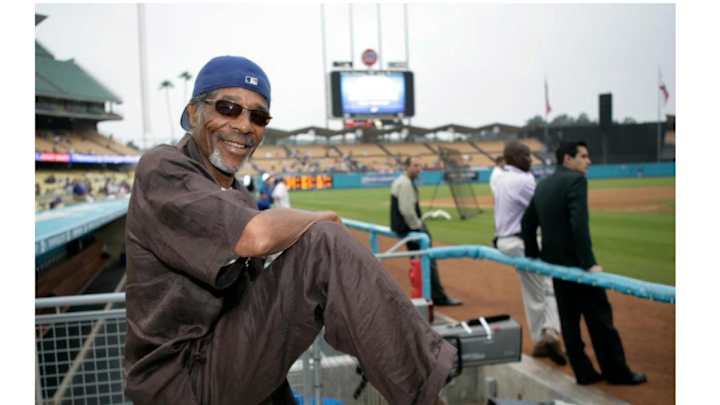Why Dodgers' Great Willie Davis Received a Grand Total of Zero Hall of Fame Votes

Talk about a rigged election. Willie Davis received a grand total of zero Hall of Fame votes, lifetime. Zip, zilch, nada.
Why? Because the Dodgers' great centerfielder never made it out of starting gate. There was no one-and-done, no opportunity to be rejected by the writers, no chance to be knocked off the ballot with fewer than 5 percent of the vote.
Why? Because the 3-Dog's name never appeared on a Cooperstown ballot, a snub which I find almost impossible to fathom. So after a recent and random search of Davis to gaze upon his accomplishments, during which I noticed the snub, I contacted new National Baseball Hall of Fame and Museum President, Tim Mead, who I knew from his long tenure as communications director for the Angels, to inquire. He put me in touch with HOF Library Director, Jim Gates, who shared what he was able to find out about the 1985 election, which was Willie's first and only shot at immortality.
But first, a little appreciation for the Dodger great's statistics.
In 62 seasons dating to the Dodgers' arrival from Brooklyn in 1958, Davis is the Los Angeles career leader in -- are you ready? -- WAR position players (59.6), at bats (7495), runs (1004), hits (2091), total bases (3094), triples (110), extra base hits (585), power-speed # (211.0; franchise leader) and offensive WAR (41.3). And he's a franchise top 10 member -- that's New York and L.A. -- in 22 categories.
Lou Brock and Catfish Hunter were elected in their first year of eligibility in 1985. No argument here.
Here are other first-time candidates on the ballot: Jesus Alou, Rico Carty, Dock Ellis, Ken Holtzman, Don Kessinger, Ed Kranepool, Mickey Lolich, Jim Lonborg, Andy Messermith, George Scott, Bobby Tolan and Roy White.
Davis' 59.6 WAR beats every one of those first-year guys (for comparison, Alou managed a whopping 0.7; Kranepool a 4.4 and Kessenger a 9.0), and would've been fourth among the entire 41 players on the ballot, being eclipsed only by Ken Boyer (62.8) and the enshrined Ron Santo (70.5), Billy Williams (63.7).
His 1053 RBIs would've led the first-timers too (Alou had 377; Tolan 497). He'd have been second to Brock (938) in steals with 398 (the next closest was White with 233). The .723 OPS, while not great, would've been fourth on the debut players list behind only Carty (.833), Scott (.767) and White (.764). And you want to tell me Davis wasn't worthy of a place on the ballot?
Here's the explanation via Gates from Cooperstown:
With respect to your inquiry about Willie Davis:
1. I can confirm that he did not appear on the HOF ballot in 1985, his first year of eligibility, nor did he appear on any BBWAA ballot thereafter. This is the list of other first time eligible who did not appear on the 1985 ballot: Darrel Chaney, Gene Clines, Joe Coleman, Frank Duffy, Ray Fosse, Ellie Hendricks, Steve Mingori, Bob Montgomery, Tom Murphy, Bob Robertson, Wayne Twitchell, and Bobby Valentine.
2. [Davis] does remain eligible for consideration by the appropriate Veterans Committee Era, but I find no record of his inclusion on any ballot. (As you are aware, these are closed room discussion, so I do not know if he was reviewed at any time.)
3. The 1985 ballot seems to be a bit of an anomaly as 11 players previously dropped were reinstated by a Special Committee. Those 11 were: Richie Allen, Ken Boyer, Clay Carroll, Ron Fairly, Curt Flood, Harvey Haddix, Denny McLain, Dave McNally, Vada Pinson, Ron Santo, and Wilbur Wood.
4. This reinstatement would seem to have taken up room on the ballot, thereby making it more difficult for the new names to be added. Unfortunately, there are precious few records kept from these meetings and Special Committees so there is minimal documentation of why these decisions were made. Additionally, all of the people who were involved in this process have passed away, so I cannot query them directly.
5. Finally, there are a few threads on the web which consider Davis to be the highest ranked player never to have appeared on the ballot. However, in my 25 years at the HOF, this is the first time I have been queried about his situation.”
To be clear, it's not that I think that Davis would've or should've been elected if given the chance. I don't, but the omission from the ballot bothers me. A lot. And look, I wouldn't expect a Hall of Fame employee to throw a possibly-deceased predecessor under the bus for a 35-year-old offense. And it is an offense.
But since I don't have someone to blame -- and for all I know the person will step forward to explain himself after reading this piece -- I don't feel as though I'm being unfair in saying this: Davis missed a chance to represent the Dodgers, to be rewarded with a certain number of votes accompanied by a percentage of those cast -- likely fewer than the 75 percent required, but better than most of his first-year peers -- because of a badly-constructed ballot. A less-than-fair election.
Best reason I can think of as to why this happened? Because someone in upstate New York in 1985 had a brain-freeze. And I understand it can get mighty cold up there in the winter.
And remember, glove conquers all.
Howard Cole has been writing about baseball on the internet since Y2K. Follow him on Twitter.
